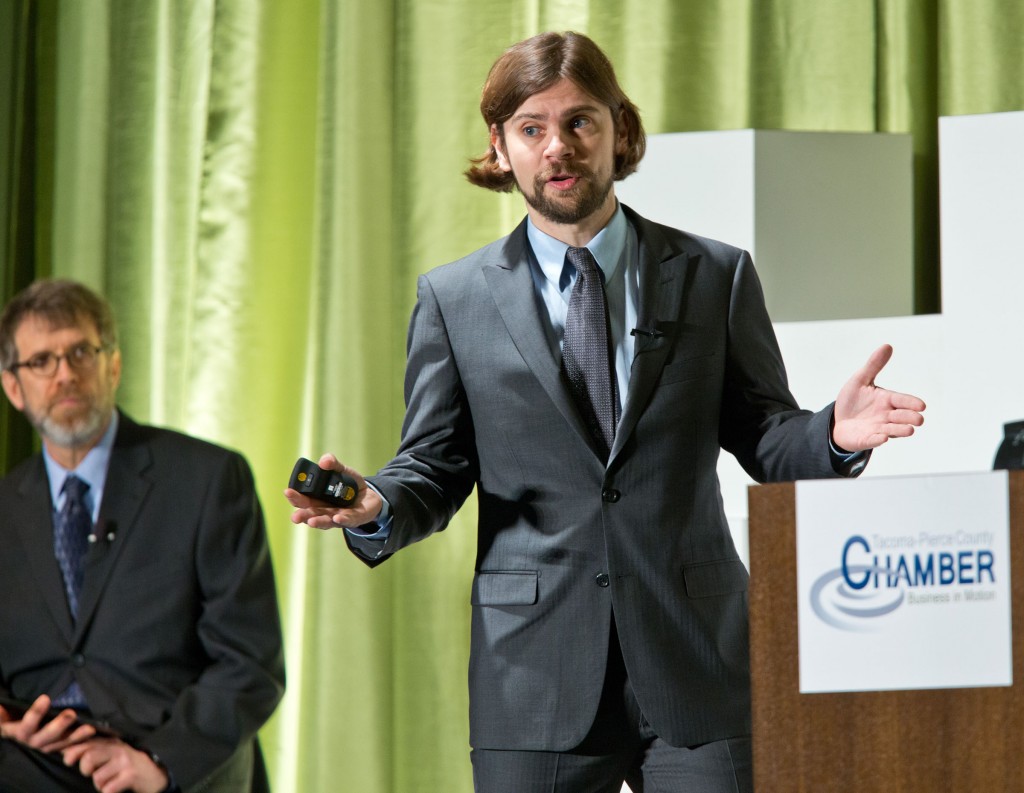Page 648 • (13,403 results in 0.029 seconds)
-
partly defined by separation from the Roman Catholic church. Maybe we shouldn’t spotlight a Catholic text in our magazine? Or, you might think not because our first name signals our location in the Pacific Northwest, the “None Zone” with the lowest affiliation to organized religion in the nation. Many of our students, staff and alumni belong to no faith tradition, and many others come from a diverse range of faiths. Perhaps we shouldn’t feature any religious text? On the other hand, PLU is a
-

estate and trade figures, at least compared to the immediate post-recession years. Despite these positive developments, however, the local recovery is not yet complete; some problems persist in the labor and real estate market. One of the key concerns is the timing (and extent) of planned deactivations at Joint Base Lewis-McChord. The base not only supports returning servicemen and servicewomen, but also acts as a major source of civilian employment and as a source of revenue for local business
-
Industrial & Engineering Chemistry Research I&EC Fundamentals (1962-1986) I&EC Process Design and Development (1962-1986) I&EC Product Research and Development (1962-1986) Inorganic Chemistry Journal of Agricultural and Food Chemistry Journal of the American Chemical Society Journal of Chemical & Engineering Data I&EC Chem and Eng Data Series (1956-1958) Journal of Chemical Information and Modeling Journal of Chemical Documentation (1961-1974) Journal of Chemical Theory and Computation—NEW! Journal of
-
option. Load from ePass Save to ePass Save Add Edit Remove Back New Delete Faculty Handbook Site Menu FACULTY HANDBOOK Update History Summary Table of Contents Table of Contents INTRODUCTION MISSION AND HISTORY SECTION I: FACULTY CONSTITUTION AND BYLAWS Article I. – THE FACULTY Article II. – THE PRESIDENT OF THE UNIVERSITY Article III. – RIGHTS AND DUTIES Article IV. – GOVERNANCE Article V. – RANK AND TENURE AND LEAVES OF ABSENCE Article VI. – GRIEVANCE, DISCIPLINARY, AND DISMISSAL PROCEDURES Article
-
Remove Back New Delete Faculty Handbook Site Menu FACULTY HANDBOOK Update History Summary Table of Contents Table of Contents INTRODUCTION MISSION AND HISTORY SECTION I: FACULTY CONSTITUTION AND BYLAWS Article I. – THE FACULTY Article II. – THE PRESIDENT OF THE UNIVERSITY Article III. – RIGHTS AND DUTIES Article IV. – GOVERNANCE Article V. – RANK AND TENURE AND LEAVES OF ABSENCE Article VI. – GRIEVANCE, DISCIPLINARY, AND DISMISSAL PROCEDURES Article VII. – GOVERNANCE COMMITTEE Article VIII
-
Save Add Edit Remove Back New Delete Faculty Handbook Site Menu FACULTY HANDBOOK Update History Summary Table of Contents Table of Contents INTRODUCTION MISSION AND HISTORY SECTION I: FACULTY CONSTITUTION AND BYLAWS Article I. – THE FACULTY Article II. – THE PRESIDENT OF THE UNIVERSITY Article III. – RIGHTS AND DUTIES Article IV. – GOVERNANCE Article V. – RANK AND TENURE AND LEAVES OF ABSENCE Article VI. – GRIEVANCE, DISCIPLINARY, AND DISMISSAL PROCEDURES Article VII. – GOVERNANCE COMMITTEE Article
-

to Facebook Marketplace Liudmyla Ostafiichuk graduated from the MSMA program before its renaming and has moved back to Seattle to continue her research career for Facebook: “[MSMA] program helped me gain a foundational knowledge of consumer behavior, analytical methods, and research techniques that are necessary for my everyday work. After graduation, I worked as a Consumer Insights Manager at T-Mobile’s Brand, Consumer, and Market Insights department where I led the early tenure Customer Health
-
Program OutcomesThe PLU DNP program outcomes are as follows: 1. Integrate and actively use science-based theories and concepts in advanced nursing practice. 2. Develop and/or evaluate effective strategies for improvement in practice including risk assessment and quality care delivery approaches that meet current and future needs of patient populations. 3. Integrate and apply current research knowledge to solve complex practice situations while identifying strategies to continuously incorporate
-
Program OutcomesThe PLU DNP program outcomes are as follows: 1. Integrate and actively use science-based theories and concepts in advanced nursing practice. 2. Develop and/or evaluate effective strategies for improvement in practice including risk assessment and quality care delivery approaches that meet current and future needs of patient populations. 3. Integrate and apply current research knowledge to solve complex practice situations while identifying strategies to continuously incorporate
-
Gateway Program DirectorA Gateway Program Director has ongoing responsibility for monitoring the philosophical, cultural, and pedagogical design, as well as the academic integrity of a PLU-operated semester-long study away experience in one of the following locations: China, England, Mexico, Norway, Trinidad and Tobago, and Namibia. As the PLU Gateway faculty representative, the Program Director assists the Wang Center for Global and Community Engaged Education in identifying and recommending
Do you have any feedback for us? If so, feel free to use our Feedback Form.


